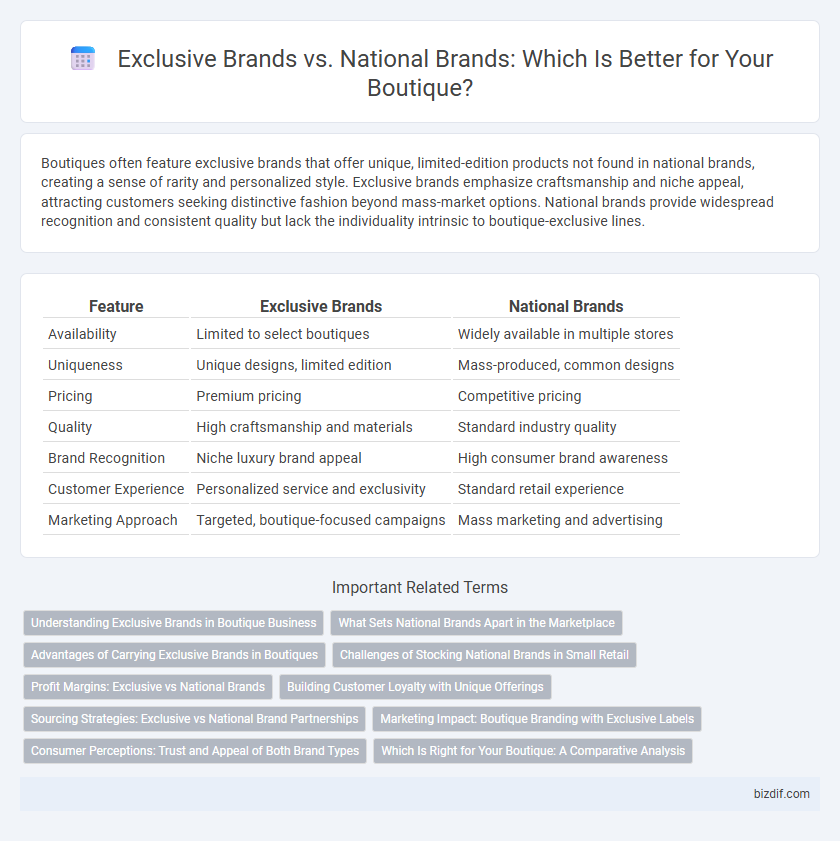Boutiques often feature exclusive brands that offer unique, limited-edition products not found in national brands, creating a sense of rarity and personalized style. Exclusive brands emphasize craftsmanship and niche appeal, attracting customers seeking distinctive fashion beyond mass-market options. National brands provide widespread recognition and consistent quality but lack the individuality intrinsic to boutique-exclusive lines.
Table of Comparison
| Feature | Exclusive Brands | National Brands |
|---|---|---|
| Availability | Limited to select boutiques | Widely available in multiple stores |
| Uniqueness | Unique designs, limited edition | Mass-produced, common designs |
| Pricing | Premium pricing | Competitive pricing |
| Quality | High craftsmanship and materials | Standard industry quality |
| Brand Recognition | Niche luxury brand appeal | High consumer brand awareness |
| Customer Experience | Personalized service and exclusivity | Standard retail experience |
| Marketing Approach | Targeted, boutique-focused campaigns | Mass marketing and advertising |
Understanding Exclusive Brands in Boutique Business
Exclusive brands in boutique business offer unique product lines that cannot be found in mainstream retail, enhancing the boutique's identity and appeal. These brands create a distinctive shopping experience by providing limited availability and often higher quality, attracting discerning customers who seek originality and exclusivity. In contrast to national brands, exclusive brands help boutiques differentiate themselves in a competitive market by fostering brand loyalty and promoting specialized craftsmanship.
What Sets National Brands Apart in the Marketplace
National brands distinguish themselves in the marketplace through widespread recognition, consistent quality standards, and extensive distribution networks, enabling them to reach a large consumer base effectively. Their robust marketing strategies and established reputations create a sense of trust and reliability among shoppers. Unlike exclusive brands, national brands leverage economies of scale to offer competitive pricing while maintaining product familiarity.
Advantages of Carrying Exclusive Brands in Boutiques
Carrying exclusive brands in boutiques offers a unique competitive advantage by enhancing brand differentiation and attracting niche customers seeking distinctive, hard-to-find products. Exclusive brands often allow boutiques to command higher profit margins due to limited availability and perceived value. This strategy also fosters customer loyalty, as shoppers associate the boutique with unique, high-quality offerings unavailable in mainstream retail.
Challenges of Stocking National Brands in Small Retail
Stocking national brands in small retail boutiques poses significant challenges due to limited shelf space and high inventory costs. Exclusive brands allow boutiques to differentiate themselves by offering unique products that attract niche customers and enhance brand identity. Managing the balance between popular national brands and exclusive collections requires strategic inventory planning to optimize sales and minimize overstock risks.
Profit Margins: Exclusive vs National Brands
Exclusive brands in boutiques often yield higher profit margins due to their limited availability and unique appeal, attracting customers willing to pay premium prices. National brands, while offering broader recognition and consistent demand, typically operate on lower profit margins because of widespread distribution and competitive pricing. Boutiques leveraging exclusive brands can enhance profitability by differentiating their product mix and minimizing direct competition with mass-market retailers.
Building Customer Loyalty with Unique Offerings
Boutiques that offer exclusive brands differentiate themselves by providing unique products unavailable in national brand stores, fostering a sense of rarity and personal connection with customers. These unique offerings create an emotional attachment, encouraging repeat purchases and long-term loyalty. By curating exclusive collections, boutiques build a strong brand identity that attracts discerning shoppers seeking distinct styles and personalized experiences.
Sourcing Strategies: Exclusive vs National Brand Partnerships
Boutiques often prioritize exclusive brand partnerships to differentiate their product offerings and attract niche customers seeking unique, high-quality items not found in mass-market stores. Sourcing strategies for exclusive brands emphasize limited edition collections, direct relationships with designers, and tailored inventory that aligns with the boutique's brand identity and customer preferences. National brand partnerships focus on leveraging established brand recognition and broad consumer appeal, ensuring consistent demand and reliable supply chains while allowing boutiques to balance exclusivity with popular merchandise.
Marketing Impact: Boutique Branding with Exclusive Labels
Boutique boutiques leveraging exclusive brands create a distinct market identity that appeals to niche consumers, enhancing customer loyalty and perceived value. Exclusive labels allow boutiques to differentiate themselves from national brands by offering unique, limited-edition products unavailable elsewhere. This strategy boosts boutique branding effectiveness by driving higher margins, fostering a sense of exclusivity, and generating targeted marketing campaigns that resonate deeply with discerning audiences.
Consumer Perceptions: Trust and Appeal of Both Brand Types
Exclusive brands in boutiques often cultivate a perception of uniqueness and higher quality, fostering strong consumer trust through limited availability and curated design. National brands benefit from widespread recognition and consistent quality, appealing to consumers seeking reliability and familiarity across various markets. Both brand types leverage distinct trust-building strategies that influence buyer appeal, with exclusive brands emphasizing exclusivity and craftsmanship while national brands focus on reputation and broad accessibility.
Which Is Right for Your Boutique: A Comparative Analysis
Choosing between exclusive brands and national brands significantly impacts your boutique's identity and customer appeal. Exclusive brands offer unique products that differentiate your store and attract niche markets, enhancing exclusivity and potentially higher profit margins. National brands provide broad recognition and customer trust, ensuring steady sales with proven popularity but may limit your boutique's uniqueness and pricing flexibility.
Exclusive Brands vs National Brands Infographic

 bizdif.com
bizdif.com